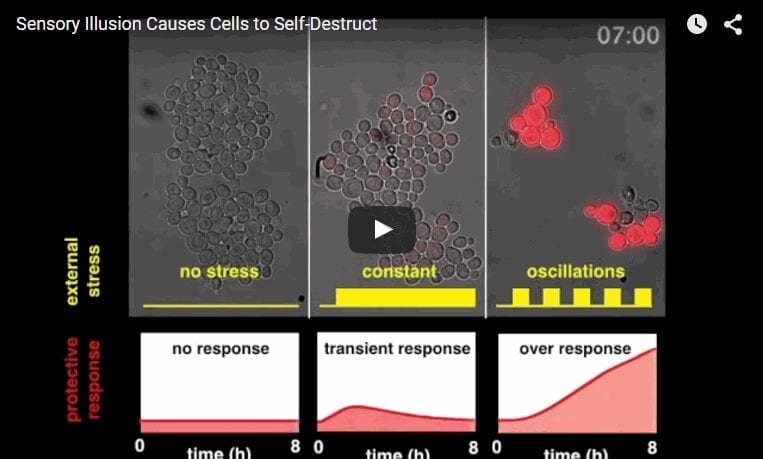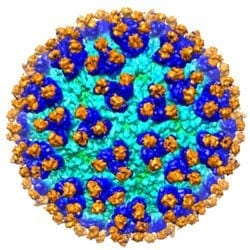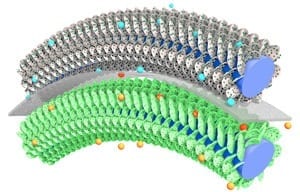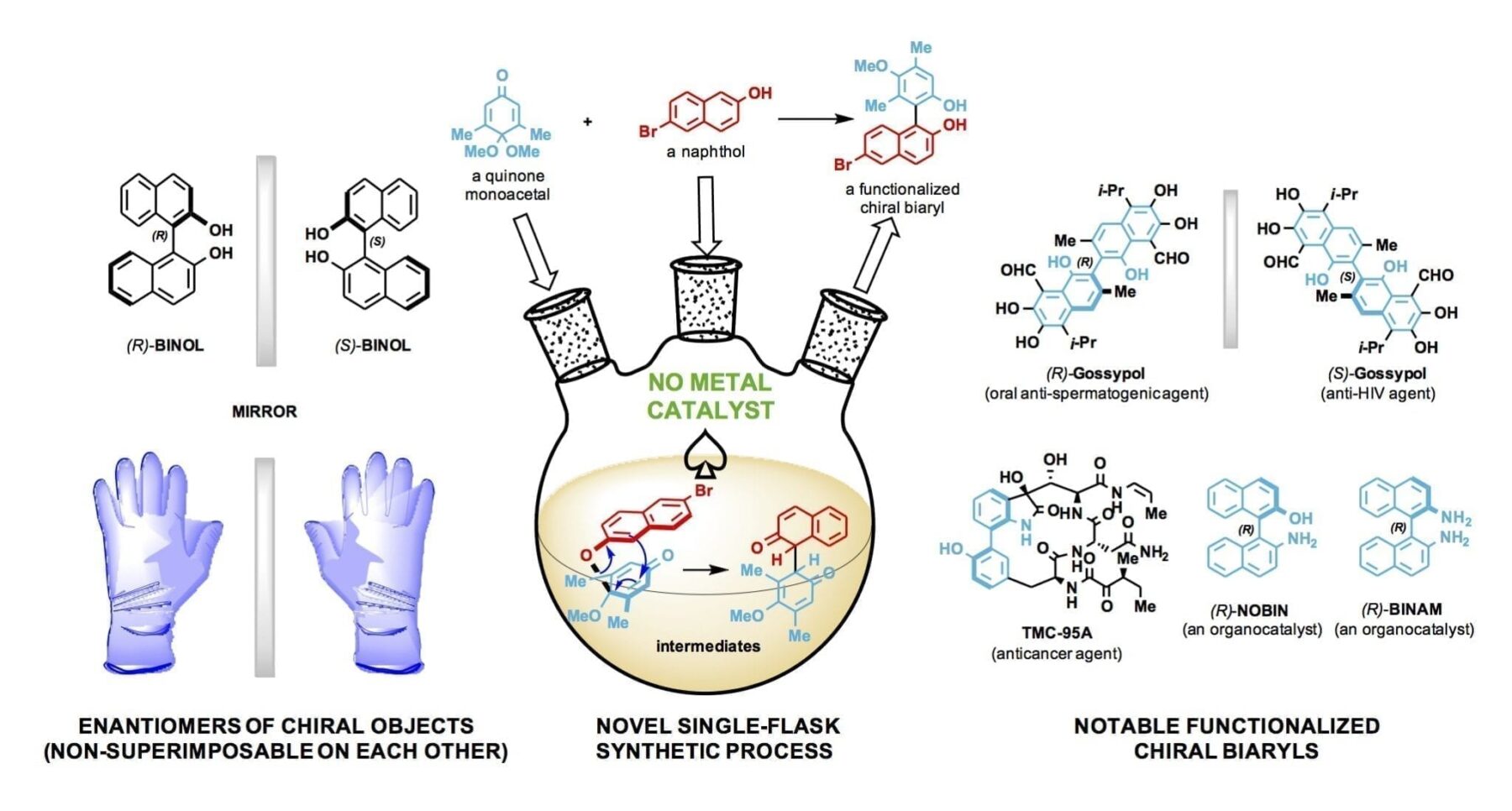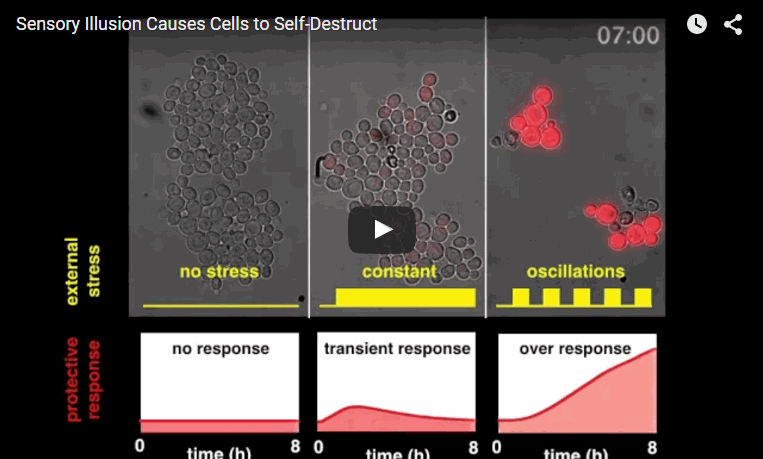
Study Reveals Importance Of Timing For Cellular Signals, Suggests Possible Tactic For Cancer Therapeutics
Magic tricks work because they take advantage of the brain’s sensory assumptions, tricking audiences into seeing phantoms or overlooking sleights of hand. Now a team of UC San Francisco researchers has discovered that even brainless single-celled yeast have sensory biases that can be hacked by a carefully engineered illusion, a finding that could be used to develop new approaches to fighting diseases such as cancer.
“The ability to perceive and respond to the environment is a basic attribute of all living organisms, from the greatest to the smallest,” said Wendell Lim, PhD, the study’s senior author. “And so is the susceptibility to misperception. It doesn’t matter if the illusion is based on molecular sensors within a single cell or neurons in the brain.”
In the new study, published online Nov. 19, 2015 in Science Express, Lim and his team discovered that yeast cells falsely perceive a specifically timed pattern of stress – caused by alternating between low and mildly increased sodium levels – as a massive, continuously increasing ramp of stress. In response, the microbes end up over-responding and killing themselves. The results, Lim says, suggest a whole new way of looking at the perceptual abilities of simple cells and could even be used to develop new approaches to fighting diseases using the power of illusion.
Timing of stress response is yeast cells’ ‘Achilles heel’
“This discovery was a bit of an accident actually,” said Lim, chair of the Department of Cellular and Molecular Pharmacology at UCSF, director of the UCSF Center for Systems and Synthetic Biology, and a Howard Hughes Medical Institute (HHMI) investigator. “We were interested in the general issue of how cells interpret information over time. Frequency is a key aspect of all our communications, whether it’s hearing language or transmitting radio signals, but do cells themselves use this kind of information? It’s something we don’t know much about.”
To explore this question, two postdoctoral fellows in Lim’s lab, Ping Wei, PhD, now at Peking University School of Life Sciences, and Amir Mitchell, PhD, set up a system that allowed them to expose yeast to a mild stressor – a small increase in salt in the yeast’s environment – and to oscillate between the increased salt level and the baseline level at different frequencies.
Normally, sensor molecules in a yeast cell detect changes in salt concentration and instruct the cell to respond by producing a protective chemical. After this transient response, the cell can resume growing happily as if conditions had not changed. The researchers found that the cells were perfectly capable of adapting when they flipped the salt stress on and off every minute or every 32 minutes. But to their surprise, when they tried an eight-minute oscillation of precisely the same salt level the cells quickly stopped growing and began to die off.
“That was just a jaw-dropping moment,” said Mitchell. “These cells should be able to handle this level of osmotic stress, but at one particular frequency they just go haywire. We’d never seen anything like this before.”
Could sensory illusions be used to fight cancer?
Mitchell, who was first author on the new study, went on to inspect the cellular mechanism underlying this unexpected, frequency-dependent toxicity. Using mathematical modeling and experiments in which he tweaked the molecular wiring of the mitogen activated protein kinase (MAPK) pathway that mediates the cells’ salt-sensing system, he revealed a sensory misperception: Because of the way the MAPK pathway is set up, the cells interpret an eight-minute oscillation as an ever-increasing staircase of salt concentration. This leads to excessive activation of the cells’ protective response, and ultimately to their death (see Movie).
Read more: Sensory Illusion Causes Cells to Self-Destruct
The Latest on: Cancer Therapeutics
[google_news title=”” keyword=”Cancer Therapeutics” num_posts=”10″ blurb_length=”0″ show_thumb=”left”]
via Google News
The Latest on: Cancer Therapeutics
- Cidara Therapeutics: Now Well-Funded To Advance Its Cloudbreak Platformon April 26, 2024 at 3:02 pm
Cidara Therapeutics, Inc. secures funding and focuses on oncology platform after passing rezafungin rights to Mundipharma. Learn more about CDTX stock here.
- Rx Rundown: Xaira Therapeutics, Ipsen, Sanofi and moreon April 26, 2024 at 4:00 am
Ipsen entered into an RNA research collaboration with Skyhawk Therapeutics that could reach $1.8 billion. MM+M is proud to announce the fourth annual Pinnacle Awards program, which celebrates the ...
- Prostate Cancer Therapeutics Market Innovating Growth Unlocking Success with Future Market Sizing Strategieson April 25, 2024 at 9:57 pm
Request To Download Free Sample of This Strategic Report @- Prostate Cancer Therapeutics Market is valued approximately at USD 9.9 billion in 2019 and is anticipated to grow with a healthy growth ...
- These Are The Biotechs Showing Up At The Biggest Cancer Meeting Of The Year (Oral Presentations)on April 25, 2024 at 2:49 pm
Meeting of ASCO is a major event for clinicians and researchers in the field of oncology. Explore more details here.
- Merck raises 2024 profit forecast on surging sales of cancer drug Keytrudaon April 25, 2024 at 12:30 pm
Merck & Co on Thursday raised its annual profit and revenue forecast on the back of strong sales for its blockbuster cancer drug Keytruda and human papillomavirus (HPV) vaccine Gardasil.
- Vietnam Silent Cancer Therapeutics Market Soaring to Prosperity Anticipating Market Size’s Ascending Pathon April 24, 2024 at 10:18 pm
Request To Download Free Sample of This Strategic Report @ https://reportocean.com/industry-verticals/sample-request?report_id=VIT663 This country research report on ...
- How mRNA Is Rewriting the Rules of Cancer Treatmenton April 24, 2024 at 2:24 pm
MIT spinout Strand Therapeutics has developed a new class of mRNA molecules that can sense where they are in the body, for more targeted and powerful treatments. What if training your immune system to ...
- SpringWorks Therapeutics Announces Abstracts Accepted for Presentation at the 2024 American Society of Clinical Oncology (ASCO) Annual Meetingon April 24, 2024 at 11:26 am
Results from Phase 2b ReNeu trial of mirdametinib in NF1-PN accepted for oral presentation –– Additional data from the Phase 3 DeFi trial of ...
- Cutting-edge RM6 Million Laboratory Opens at UMMC to Advance Cancer Treatmenton April 23, 2024 at 11:27 pm
Cancer patients can approach UMMC for enquiries on Auxi Therapeutics GMP CAR-T & CGT Laboratory. Blood cancer patients may contact Consultant Clinical Haematologist Prof Dr Bee Ping Chong, and ...
- Micro-Cap Brain Cancer Focused Plus Therapeutics Poised To Receive $3M From US Department of Defenseon April 22, 2024 at 4:00 am
Plus Therapeutics will secure $3 million in funding from the Department of Defense for pediatric brain cancer trial expansion.
via Bing News







